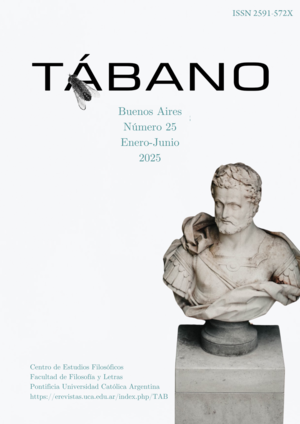On the Utility of Literary Fictions. An Approach from the Philosophy and Neuroscience of Narrative
DOI:
https://doi.org/10.46553/tab.25.2025.e10Keywords:
Philosophy, Literature, Neuroscience, Fiction, UtilityAbstract
The article aims to highlight the utility of fictions, particularly literary ones, for human life. The approach we propose is amphibious since it seeks to address this utility from both a philosophical perspective and, on the other hand, from the neuroscience of narrative. The presentation is divided into two main sections. The first explores the concept of fiction and explicitly addresses the need for human beings to create fictions in order to survive and form communities. The second provides an explanation of the primary function of imitation, incorporating the concept of mirror neurons, and lists the most relevant utilities of fictions for human life, such as: mental training to face real-life situations, the promotion of social cohesion, prosocial behaviors, social cognition, the internalization of moral norms, the consolidation of community identity, and the formation of personal identity.
Downloads
References
Boyd, B. (2009). On the Origin of Stories: Evolution, Cognition, and Fiction. Harvard University Press. DOI: https://doi.org/10.4159/9780674053595
Buceta, M. (2019). Merleau-Ponty lector de Proust: Lenguaje y verdad. SB.
Buceta, M. (2020). Merleau-Ponty y la filosofía de lo sensible como literatura. Tábano, n° 16, pp. 25-39. DOI: https://doi.org/10.46553/tab.16.2020.p25-39
Chiang, T. (2021). Exhalación. Sexto Piso.
Gottschall, J. (2012). The Storytelling Animal: How Stories Make Us Humans. Houghton Mifflin Harcourt.
Iacobini, M. (2010). Las neuronas espejo: Empatía, neuropolítica, autismo, imitación, o de cómo entendemos a los otros. Katz Editores. DOI: https://doi.org/10.2307/j.ctvm7bdfw
Harari, Y. N. (2021). De animales a dioses: Breve historia de la humanidad. Debate.
Kohan, M. (2023, mayo 27). La ficción tiene una relación diferente con la verdad. Infobae. Disponible en: https://www.infobae.com/cultura/2023/05/27/martin-kohan-la-ficcion-tiene-una-relacion-diferente-con-la-verdad/
Merleau-Ponty, M. (1969). La prose du monde. Gallimard.
Nietzsche, F. (2015). ÜberWahrheit und Lüge im außermoralischen Sinne. Reclam.
Ricoeur, P. (1996). Tiempo y narración III. El tiempo narrado. Siglo XXI.
Ricoeur, P. (2009). La identidad narrativa. En M. Stoopen Galán (Coord.), Sujeto y relato. Antología de textos teóricos. Facultad de Filosofía y Letras, UNAM.
Ricoeur, P. (2020). Sí mismo como otro. Siglo XXI.
Volpi, J. (2011). Leer la mente: El cerebro y el arte de la ficción. Alfaguara.
Zak, P. J. (2015). Why inspiring stories make us react: The neuroscience of narrative. Cerebrum, 2. Disponible en: https://pmc.ncbi.nlm.nih.gov/articles/PMC4445577/
Downloads
Published
How to Cite
Issue
Section
License
Copyright (c) 2025 Martín Buceta

This work is licensed under a Creative Commons Attribution-NonCommercial-ShareAlike 4.0 International License.


